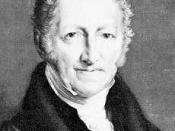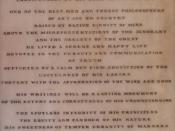Thomas Robert Malthus
In Dorking, Surrey, England, Thomas Robert Malthus was born, on February 17, 1766. He grew up in an elegant country estate called, "The Rookery," and went by his middle name Robert. Robert was he son of Daniel Malthus, a country squire and friends of Jean-Jacques the philosopher. With his father's teachings of Rousseauvian, Robert had the question of society brought upon him at an early age. In fact, during a debate with his father on the thesis of the "supremacy of society," Robert resolved to write his opinions and ideas on paper. Resulting in his theory of Malthusian population.
This result came during the Industrial Revolution in Great Britain when the population growth increased so much, that people were beginning to fear that the earth wouldn't be able to provide for the vast numbers. While the idealists of the day were preaching their faith in man, Robert, being a realist replied with, "An Essay on the Principle of Population as it effects the Future Improvement on Society, with Remarks on the Speculation of and other Writers," in 1798.
The essay giving Robert marked attention as a political economist. In the work, Robert stated his theory, the Malthusian population theory. In which said, that the human race and other populations would increase until nature would cut down population, no matter man's inclination. The only checks being, vice and misery, and their agents famine, war, and disease. In the 1803 new edition of this work, Robert added moral restraint, or abstinence as another check. And to help nature in it's combat with overproduction, lack of resources for the rising population, and irresponsibility of the lower classes, by regulating poor families' produce of children, abstinence, and no marriage.
And though some ridiculed and scorned the radical ideas of...


